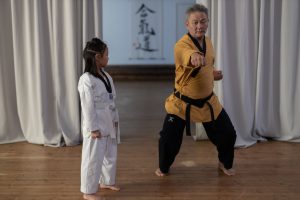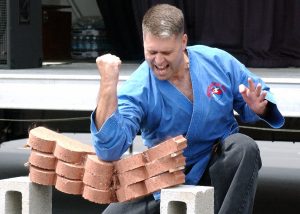
Karate is a martial art with a long and rich history that has been around for centuries. It is a martial art that is mainly based on the principles of self-defense and physical discipline and is often described as a form of “hard” or “soft” martial art. Karate has become increasingly popular in recent years and is considered one of the best methods of self-defense.
Karate originated in Okinawa, an island off the coast of Japan. It was first developed by a man named Gichin Funakoshi, who was a master of the martial arts. Funakoshi wanted to create a martial art that was easy to learn and could be used to defend oneself. He created a set of techniques that were designed to be practical and effective. The techniques that Funakoshi developed would become known as the Shotokan style of karate, which is still widely practiced today.
Karate can be practiced in a variety of ways. It can be practiced as a sport, with competitions being held around the world. It can also be practiced as a self-defense or martial art, with practitioners performing katas (formal exercises) and sparring with one another. Karate can also be used as a form of physical conditioning and as a way to improve overall health and fitness.
Benefits of Karate
Karate is beneficial for physical health because it is a full-body workout. By learning and practicing the various stances and moves, students are able to build strength, coordination, and agility. Karate can help improve balance and flexibility as well. Furthermore, karate can be a great form of cardiovascular exercise, helping to keep the heart and lungs healthy. Karate can also help burn calories and increase metabolism, making it a great choice for anyone looking to lose or maintain a healthy weight.
The mental benefits of karate are also plentiful. Karate is known for its ability to help people develop discipline, focus, and concentration. The movements of karate require intense focus and require students to pay attention to every detail. This helps to build mental strength and resilience, as well as the ability to stay present and focused in the moment. Karate can also help to reduce stress and anxiety, as it teaches students to be mindful and present in the moment.
Karate is a great martial art for both adults and children. Adults can benefit from the physical and mental benefits of karate and can use it as a form of self-defense or as a way to stay in shape. Children can also benefit from karate by learning self-discipline, respect, and focus. Karate is also a great way for children to get physical exercise, develop motor skills, and socialize with other children who enjoy karate.
Karate can help build self-confidence by teaching students to believe in themselves and their abilities. It can also help to teach students self-control and conflict resolution skills, as well as how to stand up for oneself and respect others. Karate is also a great way to learn self-defense, which can be especially important for women, who are often the victims of physical and sexual assault.

Practicing Karate Safely
In order to safely practice karate, you must know proper body mechanics and the principles of safe training. It’s important to be aware of your body’s limits and to take steps to prevent injuries. Here are some tips to help you stay safe while practicing karate.
1. Warm up and cool down. Before starting any kind of karate training, it’s important to warm up your muscles and joints. The warm-up should consist of light stretching, jogging, or other low-intensity activities. Additionally, it’s important to cool down after training by stretching or gentle aerobic activity. This helps to minimize the risk of muscle soreness and injury.
2. Wear the proper gear. It’s important to wear the right protective gear when practicing karate. This includes a karate gi (uniform), headgear, and a mouth guard. Additionally, wear shoes designed for karate – they should provide support and cushioning to help prevent injuries.
3. Pay attention to form. Good body mechanics and proper form are essential for practicing karate safely. Make sure to maintain good posture, keep your core tight, and use proper breathing techniques. It’s also important to pay attention to your partner’s form when sparring and make sure they are doing the moves correctly too.
4. Go slow. Don’t rush through the karate moves – take your time and focus on proper form. Don’t try to do anything beyond your skill level until you’ve mastered the basics.
5. Listen to your body. If you are feeling any pain or discomfort, take a break and rest. It’s always better to err on the side of caution.
Scientific Studies on Karate
Karate can improve physical fitness. A 2017 study found that karate improved the physical fitness of participants, including their cardiorespiratory fitness, muscular strength, and flexibility. The study also found that karate improved balance, coordination, and agility. Karate has also been found to improve cardiovascular health, with a 2019 study finding that karate training reduced the risk of cardiovascular disease.
Karate can also reduce stress. A 2010 study found that karate can reduce stress levels due to its physical and mental components. The study found that participants had increased feelings of relaxation after participating in karate classes. Karate can also improve mental health by reducing depression and anxiety. A 2017 study found that karate training improved mental health, with participants reporting a decrease in depression and anxiety symptoms.
Karate can also increase intelligence. A 2008 study found that children who participated in karate classes improved their intelligence, including their problem-solving skills and academic performance. The study also found that karate can help improve creativity, as participants were better able to think out of the box and come up with creative solutions to problems.
Karate has also been found to improve self-esteem and self-confidence. A 2011 study found that karate improved self-esteem in participants, with increased feelings of strength, confidence, and self-respect. The study also found that karate improved participants’ self-discipline and overall sense of well-being.